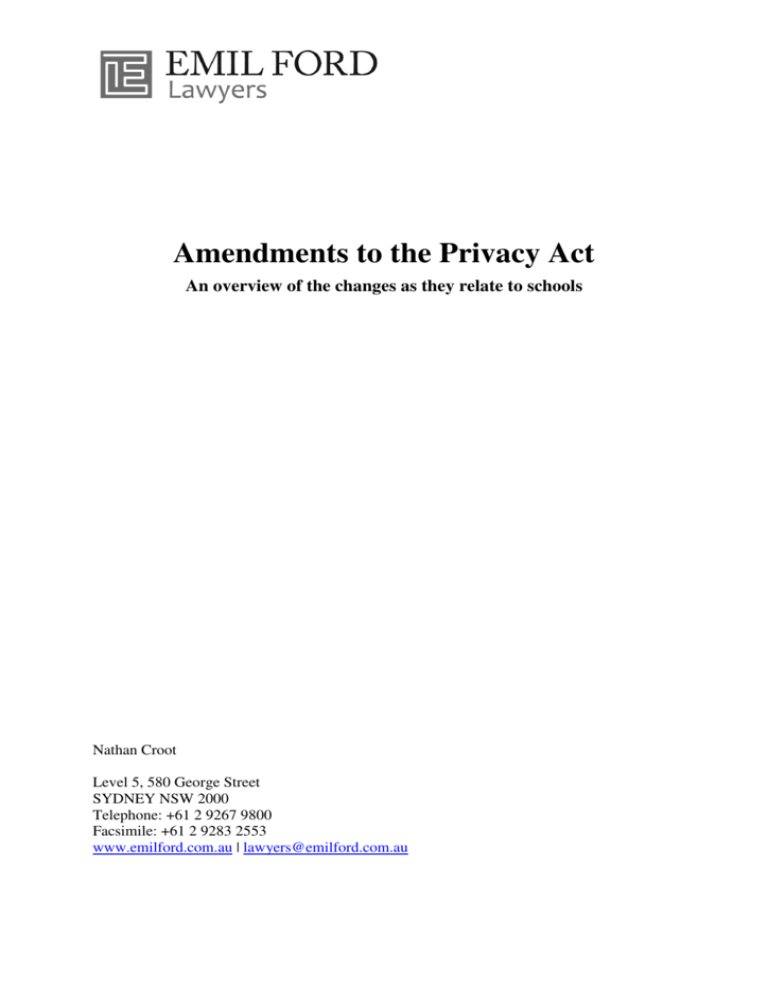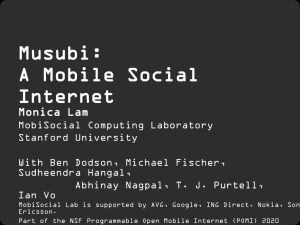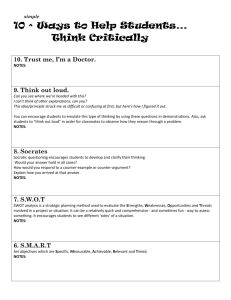Amendments to the Privacy Act
advertisement

Amendments to the Privacy Act An overview of the changes as they relate to schools Nathan Croot Level 5, 580 George Street SYDNEY NSW 2000 Telephone: +61 2 9267 9800 Facsimile: +61 2 9283 2553 www.emilford.com.au | lawyers@emilford.com.au Introduction On 12 March 2014, a series of amendments to the Privacy Act 1988 will take effect. The Privacy Act is one of many Acts which govern privacy in Australia. One of the key components of the Privacy Act is that it requires certain entities to comply with privacy principles. The Privacy Act currently contains the National Privacy Principles (NPPs) and the Information Privacy Principles (IPPs). The NPPs apply to organisations. An organisation is: (a) an individual; or (b) a body corporate; or (c) a partnership; or (d) any other unincorporated association; or (e) a trust; that is not a small business operator, a registered political party, an agency, a State or Territory authority or a prescribed instrumentality of a State or Territory. A small business operator is a business that had an annual turnover for the previous financial year of $3,000,000 or less. However, a business is not a small business operator if it provides a health service to another individual and holds health information. The vast majority of, if not all, independent schools provide health services to students (“sick bay”) and hold information about students’ health. Therefore, the NPPs apply to independent schools. The NPPs do not apply to NSW public schools because they are State authorities. The IPPs apply to Commonwealth agencies and are similar to the NPPs. The IPPs do not apply to NSW public schools. NSW public schools must comply with the Information Protection Principles in the Privacy and Personal Information Protection Act 1998 (NSW). These principles and the obligations of NSW public schools are not affected by the amendments to the Privacy Act. The Commonwealth Government has made the amendments to the Privacy Act in response to the 295 recommendations made by the Australian Law Reform Commission in its 2008 report on privacy law in Australia1. The amendments deal with approximately 197 of the recommendations. There are three key parts of the amendments that apply to schools: (a) the amended definition of personal information; (b) the Australian Privacy Principles (APPs); and (c) the updated enforcement options. Definition of Personal Information The current definition of personal information is: Information or an opinion (including information or an opinion forming part of a database), whether true or not, and whether recorded in a material form or not, about an individual whose identity is apparent, or can reasonably be ascertained, from the information or opinion. The new definition will be: 1 For Your Information: Australian Privacy Law and Practice (ALRC Report 108) 1 information or an opinion about an identified individual, or an individual who is reasonably identifiable: (a) whether the information or opinion is true or not; and (b) whether the information or opinion is recorded in a material form or not. Apart from the formatting, there are some key changes to the definition of personal information. The clarification that the definition includes information or an opinion forming part of a database has been removed. When the NPPs were first enacted, there was some apparent uncertainty about whether information held in a database would be personal information for the purposes of the Privacy Act. This clarification now seems unnecessary and archaic with the prevalence of digital records and databases. There is no longer any doubt that information held in a database can be personal information. Therefore, the clarification has been removed. Another change is that the definition now refers to “an identified individual or an individual who is reasonably identifiable” rather than “an individual whose identity is apparent, or can reasonably be ascertained”. This change is, in part, to make the definition more consistent with the definitions in other jurisdictions. The change also relates to the distinction between “identity” and “identification”: An important distinction needs to be made between identity and identification. Identity is a complex, multifaceted notion. Each of us has a range of different identities defined through relations with others, position, status, actions, behaviours, characteristics, attitudes and the circumstances of the moment… Identification is the action of being identified, of linking specific information with a particular person. An individual’s identity has a degree of fluidity and is likely to change over time. The extensive linking of different information about an individual may restrict or limit this fluidity … Identification can potentially relate to a wide range of elements of an individual’s identity. In practice, identifying an individual generally involves focusing on those things that distinguish that individual from others including, legal name, date of birth, location or address and symbolic identifiers such as a driver’s licence number.2 Perhaps, the most important practical change is that the amended definition does not require an individual to be identified “from the information or opinion”. Under the current definition, a school must look at the information or opinion in question (usually a document) and determine whether an individual’s identity is apparent or reasonably ascertainable from that information or opinion alone. Under the new definition, the school will need to consider more than just the information or opinion to determine whether an individual is reasonably identifiable. An individual will be reasonably identifiable when the individual can be identified from the information or from the information and any other information the school has or may access without unreasonable cost or difficulty. If the information refers to an individual by name, the information will be personal information under either definition. However, there may be circumstances when an individual’s identity is not apparent from the information but the individual may be reasonably identifiable. 2 M Crompton, ‘Under the Gaze, Privacy Identity and New Technology’ (Paper presented at International Association of Lawyers 75th Anniversary Congress, Sydney, 28 October 2002) as quoted from For Your Information: Australian Privacy Law and Practice (ALRC Report 108) 2 For example, an individual may make a complaint to the office receptionist anonymously. The individual does not wish to leave her name but leaves a number to be contacted by the principal or other senior staff member. The school office receptionist takes a message. The message notes that the caller is a woman with a particular phone number but does not include her name. The identity of the woman is not apparent from what is in the message. However, the woman may be reasonably identifiable because the school may be able to identify the woman by using the telephone number and other information available to the school. If the woman is a parent or has made other complaints, her name and number may be in the school’s database. The school may also identify the woman by searching the number online. The Australian Privacy Principles The APPs will replace the NPPs and the IPPs in the Privacy Act and will apply to APP Entities. An APP Entity is an agency or organisation. The major difference is public sector and private sector entities will need to comply with the same privacy principles rather than different ones. As discussed above, the vast majority of, if not all, independent schools are organisations under the Privacy Act. Therefore, independent schools are APP Entities and will need to comply with the APPs. The APPs will only apply to federal public sector agencies. The change will not affect NSW public schools. APP 1 – Open and Transparent Management of Personal Information Independent schools will need to ensure that they have policies and practices that ensure that personal information is managed openly and transparently. APP 1 effectively replaces NPP 5. However, APP 1 is much more prescriptive in its requirements. Under NPP 5, there was a relatively vague requirement for a document that sets out how the school manages personal information. APP 1 explicitly sets out that independent schools need a privacy policy and that it must cover the following information: (a) the kinds of personal information that the entity collects and holds; (b) how the entity collects and holds personal information; (c) the purposes for which the entity collects, holds, uses and discloses personal information; (d) how an individual may access personal information about the individual that is held by the entity and seek the correction of such information; (e) how an individual may complain about a breach of the Australian Privacy Principles, or a registered APP code (if any) that binds the entity, and how the entity will deal with such a complaint; (f) whether the entity is likely to disclose personal information to overseas recipients; (g) if the entity is likely to disclose personal information to overseas recipients— the countries in which such recipients are likely to be located if it is practicable to specify those countries in the policy. APP 1 also places a positive obligation on independent schools to implement practices, procedures and systems that will ensure compliance with the APPs. APP 2 – Anonymity and Pseudonymity NPP 8 required independent schools to give individuals the option to deal with them anonymously. This requirement is maintained in APP 2 and there is a new requirement to allow individuals to deal with the school by using a pseudonym. 3 For independent schools, there will probably be a limited number of individuals for whom these requirements will apply. There is an exception to the requirements when it is impractical to deal with individuals who have not identified themselves. It would be impractical for most individuals with whom independent schools deal (students, staff and parents) not to identify themselves and so APP 2 will have a limited application for most independent schools. However, in the example of the individual who makes a complaint to the school, it is not impractical for that individual not to identify herself and so, in that situation, the school must give the individual the option of anonymity or pseudonymity. APP 3 – Collection of Solicited Personal Information APP 3 is very similar to NPP 1 and outlines how and when independent schools may collect personal and sensitive information. Independent schools must not collect personal information about an individual unless it is reasonably necessary for one or more of its functions or activities. APP 3 includes the word “reasonably” while NPP 1 did not. However, there is unlikely to be any practical difference for independent schools because generally reasonableness has been implied in NPP 1. APP 3 also clarifies that independent schools must only collect sensitive information about an individual if the individual consents or an exception applies. As sensitive information is also personal information, an independent school may only collect it if it is reasonably necessary for one or more of its functions or activities. The exceptions are similar under APP 3 as they were under NPP 1. The most significant change is the introduction of an exception for a “general health situation”, which is a situation when an independent school reasonably believes the collection of sensitive information is necessary to lessen or prevent a serious threat to the life, health or safety of any individual or to public health or safety and it is unreasonable or impractical to obtain the individual’s consent. It should be noted that the definition of a general health situation closely reflects the language of an existing exception in NPP 10 in relation to the collection of sensitive information. APP 4 – Dealing with Unsolicited Personal Information APP 4 creates a new obligation, which deals with a hole in the NPPs. At times independent schools will receive personal information which it did not request. Upon receiving such information, an independent school must consider whether it is permitted to collect the information under APP 3. If so, it must treat the information as it would information that it did request. If it is not permitted to collect the information, it must destroy or de-identify the information, unless it is not lawful or reasonable to do so. APP 5 – Notification of Personal Information APP 5 carries over the same requirements of NPP 1.3, which many independent schools dealt with by using a standard collection notice. APP 5 requires independent schools to notify individuals of some additional matters, being the access, correction and complaints process in the school’s privacy policy and the location of any likely overseas recipients of individuals’ information. APP 6 – Use and Disclosure of Personal Information APP 6 sets out the circumstances in which independent schools may use or disclose personal information and generally reflects the obligations in NPP 2. Therefore, there is no great change for independent schools. The most significant change is that APP 6 contains some additional exceptions for using or disclosing personal information. These exceptions are: 4 (a) to assist in locating a missing person; (b) to establish, exercise or defend a legal or equitable claim; or (c) for the purposes of a confidential alternative dispute resolution. APP 7 – Direct Marketing Direct marketing is currently only an exception in relation to the use or disclosure of personal information under NPP 2. However, APP 7 will deal with it as its own privacy principle. An independent school may only use personal information for direct marketing if the individual has consented or has a reasonable expectation that his or her personal information will be used for direct marketing. The independent school must also ensure that the conditions relating to opt-out mechanisms are met. APP 8 – Cross-Border Disclosures Under APP 8, if an independent school discloses personal information overseas, the school must take reasonable steps to ensure the recipient does not breach the APPs in relation to the personal information. It is possible that in some circumstances, a breach of the APPs by the recipient will be taken to be a breach by the school. There are several exceptions to these obligations. APP 9 – Adoption, Use or Disclosure of Government Related Identifiers APP 9 essentially reflects NPP 7 and so there is little practical change for independent schools. Independent schools must not adopt, use or disclose government related identifiers (such as Medicare number, tax file number and other identifiers issued by a government) unless an exception applies. APP 10 – Quality of Personal Information Like NPP 3, APP 10 will require independent schools to ensure all personal information they collect is accurate, up-to-date and complete. However, APP 10 differs from NPP 3 as it requires personal information to be relevant to the purpose of the use or disclosure of the information when an independent school uses or discloses personal information. This is in addition to the requirement that it must be accurate, up-to-date and complete. APP 11 – Security of Personal Information APP 11 has similar requirements to NPP 4. Independent schools must take reasonable steps to protect the personal information they hold from: (a) interference; (b) misuse; (c) loss; and (d) unauthorised access, modification or disclosure. If an independent school holds personal information which it may no longer use for an authorised purpose, the school must take reasonable steps to destroy or de-identify the information unless the school is legally required to keep the information. APP 12 – Access to Personal Information NPP 6 currently deals with access to and correction of personal information. Access and correction will be dealt with under separate APPs. 5 Independent schools will still be required to provide individuals with access to any personal information they may hold about the individual. The exceptions to this requirement substantially reflect the current exceptions in NPP 6. However, APP 12 sets out additional requirements in relation to providing access. Independent schools will need to: (a) respond to a request for access within a reasonable time; (b) if it is reasonable to do so, give access in the way the individual requests; (c) if access is to be denied, provide written reasons why the request is denied and how the individual may complain; (d) not charge an excessive fee to provide access; and (e) not charge a fee to request access. APP 13 – Correction of Personal Information NPP 6 requires an individual to show that the information an independent school holds about him or her is inaccurate, incomplete or not up-to-date and that it should be corrected. This obligation has been removed. Under APP 13, independent schools need to take reasonable steps on their own initiative to correct personal information to ensure that it is accurate, complete and up-to-date. In determining whether the information is accurate, complete and up-to-date, an independent school may have regard to the purpose for which the information is held. An independent school must correct the personal information if the school is satisfied the information needs to be corrected or the individual requests that the information be corrected. The Updated Enforcement Options Currently under the Privacy Act, a breach of the NPPs, or of some other part of the Act, is unlikely to lead to any serious consequences. The amendments to the Privacy Act increase the Commissioner’s powers and the enforcement options available to the Commissioner. The amendments do not include a statutory offence or cause of action for breach of privacy, although such an amendment may come at a later stage. The Commissioner usually responds to a privacy complaint by arranging a conciliation conference between the parties. However, the Commissioner will have the option to use the following enforcement options when the amendments come into force: (a) The Commissioner may conduct an assessment of a school’s compliance with the APPs. (b) The Commissioner may investigate a breach of privacy based on a complaint or on the Commissioner’s own motion. The same remedies will be available for both types of investigations. (c) The Commissioner may make a determination, including making declarations of a breach, of an individual’s right to compensation or of specified steps a school must take to ensure another breach does not occur. Such determinations may be enforced in the Federal Court or the Federal Magistrates Court. (d) The Commissioner may accept enforceable undertakings from an independent school to prevent or rectify a breach. Such undertakings may be enforced in the Federal Court or the Federal Magistrates Court. (e) The Commissioner may, for serious breaches of the APPs or repeatedly engaging in conduct that breaches the APPs, apply to the Federal Court or the Federal Magistrates Court for an order that an independent school pays a civil 6 penalty to the Commonwealth for the breach. The victim of the breach does not have the right to apply for the order and it is not a criminal offence. Conclusion Independent schools should be aware of the amendments to the Privacy Act. Although there may be little practical effect on a daily basis, independent schools should take some steps to ensure they are prepared for when the amendments come into force. All independent schools should ensure that they update their privacy policy so that it covers the matters in APP 1. Independent schools should also ensure that they implement practices, procedures and systems that comply with the APPs. 7






